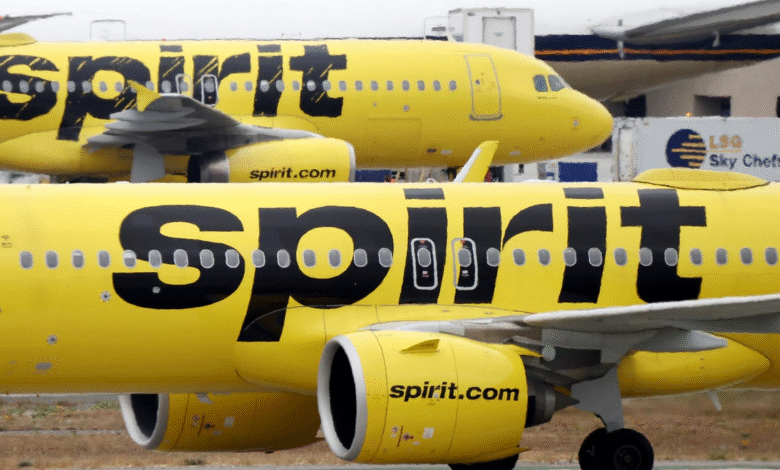Spirit Airlines Pilot Furloughs: 270 Pilots Affected

Spirit Airlines pilot furloughs are set to reshape the airline’s operational landscape as the company grapples with financial stability amid changing market conditions. In an announcement made on Monday, Spirit revealed plans to furlough 270 pilots this fall while also downgrading 140 from captain to first officer. This significant move comes just months after emerging from Chapter 11 bankruptcy, highlighting the airline’s attempts to stabilize its finances and adjust to a reduced off-season flight schedule. As reported in Spirit Airlines news, these shifts are part of broader airline staffing changes that reflect the ongoing challenges faced by the aviation industry. With demand slowing, particularly during off-peak travel periods, Spirit is determined to navigate pilot layoffs while ensuring the efficient operation required to attract and retain customers.
The recent announcement regarding Spirit Airlines pilot layoffs symbolizes a crucial turnaround for the airline as it adjusts to uncertain financial conditions. As the airline prepares to downsize its workforce significantly, it aims to align its staffing levels with a revamped flight schedule during off-peak seasons. These furloughs, affecting many of Spirit Airlines’ dedicated pilots, are part of a broader effort to enhance operational efficiencies and overcome market challenges. Furthermore, the downgrading of pilot roles from captain to first officer underscores the tough decisions airlines must make to maintain financial viability. As Spirit Airlines navigates its recovery trajectory, maintaining a balance between staffing needs and service quality remains paramount in ensuring a stable future.
Overview of Spirit Airlines Pilot Furloughs
Spirit Airlines is set to furlough 270 pilots this upcoming fall, marking a significant staffing shift within the airline. This decision comes as Spirit Airlines grapples with a reduced operational schedule aimed at stabilizing its financial standing. The furloughs will go into effect on November 1, a move seen as necessary to better align pilot staffing with the decreased number of flights scheduled. The impact of these furloughs is likely to be felt not only by the laid-off pilots but also among their colleagues, as shifts in staffing levels can affect morale and career progression within the airline.
In addition to the furloughs, Spirit Airlines will downgrade 140 pilots from captain to first officer status, further reflecting the airline’s strategic adjustments amidst ongoing financial challenges. This dual approach—furloughs and downgrades—underlines a broader trend within the airline industry as companies reevaluate their workforce in response to fluctuating travel demand. With many airlines reporting lower passenger numbers, especially during slower travel seasons, such steps are essential for maintaining financial stability while navigating these unpredictable times.
The Financial Implications of Airline Staffing Changes
Airline staffing changes, such as those being implemented by Spirit Airlines, are directly tied to the financial health of the airline. Following its emergence from Chapter 11 bankruptcy in March, Spirit is working diligently to recover from past fiscal instability. By reducing the number of available pilots, the airline aims to decrease operational costs in accordance with expected lower demand during off-peak seasons. These changes can have both immediate and long-term effects on the airline’s financial stability and its ability to attract and retain talent in the highly competitive airline sector.
Moreover, these staffing changes at Spirit could signal to industry observers the importance of adaptability in response to market conditions. The need for airlines to adjust their workforce reflects broader economic realities, such as fluctuating demand and consumer preferences. Spirit Airlines is not alone in facing these decisions; many airlines have similarly opted for layoffs and restructurings in response to ongoing market pressures. This pattern illustrates the critical nature of financial management within the airline industry, emphasizing how staffing decisions are often made with profitability as a priority.
Impact of Pilot Layoffs on Employee Morale
The announcement of pilot furloughs and downgrades at Spirit Airlines is likely to have profound implications on employee morale. Layoffs often create an environment of uncertainty, where remaining employees may worry about job security and their own future within the company. Captain Ryan Muller, the chairman of Spirit’s ALPA chapter, acknowledges the difficulty of this news, stating that it reduces the perceived value of seniority and careers for pilots at the airline. Such sentiments can lead to reduced productivity and affect the overall culture among the airline’s workforce.
Additionally, the commitment to treating all affected team members with compassion and respect is an essential step in mitigating the potential negative effects of these staffing changes. Transparent communication and support services can play a critical role in helping employees navigate the emotional and financial challenges that come with job uncertainty. For Spirit Airlines, maintaining a motivated workforce amidst these layoffs will be a crucial aspect of its broader strategy to ensure operational efficiency and financial recovery.
Navigating Airline Financial Stability Post-Bankruptcy
Spirit Airlines’ recent decision to implement pilot furloughs highlights the ongoing challenges airlines face in ensuring financial stability post-bankruptcy. Since emerging from Chapter 11 in March, the airline has been actively reworking its operational strategies to respond to changing market demands and consumer behaviors. By adjusting its staffing strategy now, Spirit aims to streamline operations as it seeks to recover from previous financial hardships that necessitated its bankruptcy filing.
In its efforts to stabilize financially, Spirit Airlines is not just focusing on immediate cost-cutting measures like furloughs; it is also exploring new product offerings and enhancing customer experiences. The airline has begun to introduce more upscale travel options, diverging from its traditional no-frills service model. These strategic shifts may help rebuild brand loyalty and financial viability, but they require careful management of resources, including pilot staffing, to ensure that operational capabilities align with the new service vision.
Long-term Effects of Staffing Changes on Airlines
The long-term ramifications of staffing changes, like those seen at Spirit Airlines, could significantly influence how airlines operate in the future. With pilot furloughs and other workforce reductions becoming a commonplace response to market demands, the sustainability of these practices raises important questions about the industry’s future. As airlines strive to balance operational efficiency with the needs of their workforce, it may become necessary to develop more resilient staffing models that can better withstand the fluctuations of the travel market.
Ongoing adjustments in staffing can impact recruitment and retention, ultimately shaping the future workforce landscape in the airline industry. For instance, aspiring pilots may rethink their long-term career prospects if faced with consistent layoffs and limited advancement opportunities. Thus, airlines like Spirit must focus not only on immediate financial recovery but also on strategies to attract and maintain a skilled workforce that is vital for the industry’s growth and sustainability.
Assessing the Future of Spirit Airlines Pilots
Given the recent furloughs and downgrades, the future of Spirit Airlines pilots appears uncertain. The reduction in workforce size in conjunction with a shift in job roles may discourage potential candidates from pursuing a career with the airline. Pilots already working for Spirit may also reconsider their allegiance if they perceive diminishing career opportunities. The decisions made in response to financial pressures must be carefully weighed against the potential impact on the pilot talent pool.
As Spirit Airlines continues to navigate its post-bankruptcy environment, fostering a positive future for its pilots will be essential. This can be achieved through clear communication of the airline’s vision for recovery and open discussions about career growth and development opportunities. By supporting its pilots, Spirit can enhance retention rates and build a more committed workforce as it works toward financial stability and sustainable growth.
Challenges in Airline Recovery Strategies
Spirit Airlines’ decision to furlough pilots is part of a broader set of challenges that airlines face in recovering from recent economic turmoil. Recovery strategies often require difficult decisions, such as workforce reductions, that can create immediate operational efficiencies but may jeopardize long-term talent retention. These furloughs are reflective of trends in the airline industry, where staffing adjustments are increasingly necessary to adapt to shifting consumer demands and economic realities.
Additionally, the competition within the airline industry adds another layer of complexity to recovery strategies. As airlines compete for market share in a post-COVID environment, each company’s decision to adjust pilot staffing can significantly impact its operational capability. Thus, recovery must be balanced with strategies that not only reduce costs but also position the airline favorably within the competitive landscape.
The Role of Unions in Airline Staffing Decisions
The involvement of unions, such as the Air Line Pilots Association (ALPA), in staffing decisions at Spirit Airlines is crucial. Unions advocate for the rights of employees and can provide important insights and recommendations on how to manage furloughs and staffing changes in a fair and equitable manner. Their presence ensures that affected pilots receive the support they need during turbulent transitions, including negotiation of terms when layoffs and downgrades are necessary.
Moreover, unions play a significant role in maintaining a dialogue between airline management and employees. By facilitating communication, unions can help mitigate some of the negative implications of staffing changes, ensuring that pilots’ concerns are represented and heard. In the context of Spirit Airlines’ recent announcements, collaboration with unions will be vital for the airline to navigate these complex challenges while upholding employee rights and trust.
Conclusion: Navigating Future Changes in the Airline Industry
As the airline industry adapts to changing market conditions, Spirit Airlines’ recent staffing changes serve as an important case study in resilience and flexibility. The decision to furlough pilots and downgrade roles exemplifies the difficult choices airlines must make to sustain operations and enhance financial stability. Going forward, finding the balance between cost management and employee support will be critical to ensuring long-term sustainability and labor morale.
Ultimately, the challenges faced by Spirit Airlines are emblematic of a larger trend in the aviation sector. As airlines contend with fluctuating demands and economic pressures, the ability to navigate these changes while maintaining a talented workforce will determine the industry’s resilience. With effective strategies that prioritize both operational efficiency and employee welfare, airlines can better position themselves for a successful future.
Frequently Asked Questions
What are the reasons behind Spirit Airlines pilot furloughs in 2023?
Spirit Airlines announced that it will furlough 270 pilots this fall primarily due to a reduced off-season flight schedule aimed at stabilizing the airline’s finances. These pilot layoffs are part of greater airline staffing changes intended to align crew requirements with operational capacities.
When will the furloughs for Spirit Airlines pilots take effect?
The furloughs for Spirit Airlines pilots will take effect on November 1, 2023. This decision follows a downgrade for 140 pilots from captain to first officer, set to begin on October 1, as they adjust to changing staffing needs.
How does the recent Spirit Airlines furlough affect pilot careers?
The pilot furloughs at Spirit Airlines will diminish the value of pilot seniority and career trajectories at the airline. Many pilots are concerned about the long-term implications of the airline’s downsizing on their professional futures.
What steps is Spirit Airlines taking to improve financial stability amid pilot layoffs?
In response to the challenging financial landscape, Spirit Airlines is focusing on enhancing efficiency in operations and has introduced more upscale travel options to appeal to customers, aiming to return to profitability following its emergence from Chapter 11 bankruptcy.
How might Spirit Airlines’ pilot furloughs impact the airline industry?
Spirit Airlines pilot furloughs reflect a broader trend in the airline industry as many carriers grapple with decreased demand, especially during off-peak seasons. Such staffing changes may lead to increased competition among airlines to maintain efficient operations.
Is there support for Spirit Airlines pilots affected by furloughs?
Spirit Airlines has expressed its commitment to treating all affected team members with compassion and respect during the furlough process. The Air Line Pilots Association (ALPA), the pilots’ union, is also involved in addressing the concerns of Spirit Airlines pilots.
What previous actions has Spirit Airlines taken regarding pilot staffing?
In the past year, Spirit Airlines announced hundreds of pilot furloughs as it approached bankruptcy. This pattern of airline staffing changes demonstrates the company’s ongoing struggle to adjust to market demands and financial pressures.
What can Spirit Airlines pilots do if they are furloughed?
Furloughed pilots from Spirit Airlines may explore options such as temporary employment with other airlines, retraining for different roles, or awaiting recall opportunities as the airline adjusts its operational needs.
| Key Point | Details |
|---|---|
| Furlough Announced | Spirit Airlines will furlough 270 pilots this fall. |
| Downgrade of Pilot Positions | 140 pilots will be downgraded from captain to first officer. |
| Effective Dates | Furloughs begin on November 1; downgrades take effect on October 1. |
| Financial Stability Efforts | Steps are being taken to stabilize finances and align staffing with flight schedules. |
| Response to Demand | Weaker demand reported industry-wide, particularly during off-peak travel periods. |
| Company Statement | Spirit Airlines emphasizes efficiency and a commitment to treating affected employees with respect. |
Summary
Spirit Airlines pilot furloughs have become a significant issue as the airline faces the need to adjust its operational structure in response to financial challenges. The decision to furlough 270 pilots and downgrade 140 positions reflects the airline’s approach to stabilizing its finances during a period of reduced demand. As the industry experiences weaker off-peak travel, Spirit’s commitment to realigning staffing is crucial for the future profitability of the airline.




